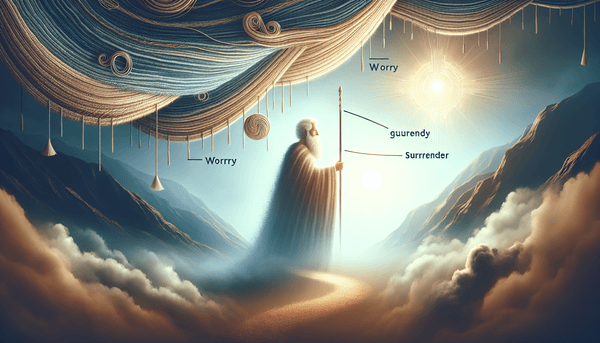The Power of Surrender in Life's Journey
At its core, surrender is the relinquishment of control, an acceptance of life's ebbs and flows, and a humble admission that perhaps the universe holds greater plans than those we conceive. It's beautifully exemplified in the spiritual realm, where surrendering to God's will embodies a profound act of faith. This is seen when Jesus, in the depths of his anguish in the Garden of Gethsemane, submits to God's will, saying, 'Father, if you are willing, take this cup from me; yet not my will, but yours be done.' (Luke 22:42). Such surrender is not a passive resignation but an active engagement in a life directed by a higher wisdom. In practicing surrender, we can use prayer and reflection to align our desires with divine timing, much like the Prodigal Son, who returned to his father's embrace with a surrendered heart (Luke 15:18-20). Through this, we learn to navigate life's uncertainties, armed with the confidence that comes from trusting in a plan greater than our own.
Facing Inadequacy with Faith: Lessons from Moses
Moses stands as a towering figure of human history, a man who felt the crushing weight of inadequacy yet rose to lead a nation to freedom. His initial encounter with God at the burning bush (Exodus 3:1-4) and his subsequent plea of insufficiency (Exodus 3:11) highlight a universal struggle with self-doubt. However, God's response, 'I will be with you' (Exodus 3:12), serves as a timeless reassurance for all who feel unprepared for the tasks ahead. As Moses parted the Red Sea (Exodus 14:21-22) and received the Ten Commandments (Exodus 20:1-17), he did so not by his strength but through unwavering faith in God's power. Similarly, we can take heart that our inadequacies are not disqualifications but opportunities for divine strength to manifest in our lives, urging us to step out in faith, even when the path ahead seems daunting.
Embracing Life's Direction Through Trust and Obedience
Life can often resemble a complex maze, where each turn brings new decisions and potential doubts. Yet, the essence of spiritual growth lies in the ability to trust in a wisdom that transcends our understanding. This trust is beautifully articulated in Proverbs 3:5-6, which encourages us to 'trust in the Lord with all your heart and lean not on your own understanding.' It is this divine guidance that directs our paths, even when the destination remains unseen. Embracing life's direction involves a delicate dance between action and patience, ensuring that while we strive for our goals, we remain open to the surprises of God's timing. As Jeremiah reminds us, 'For I know the plans I have for you,' declares the Lord, 'plans to prosper you and not to harm you, plans to give you hope and a future' (Jeremiah 29:11). By holding onto this promise, we can face each day with a heart full of hope, knowing that we are never alone in our journey.
Conclusion
As we traverse the varied landscapes of our lives, it's clear that surrendering to a higher power, embracing our inadequacies with faith, and trusting in the unseen hand of divine guidance can offer profound solace and direction. The biblical narrative of Moses, an ordinary man called to an extraordinary destiny, reminds us that with God, we are capable of far more than we ever imagined. May we each find the courage to let go of our fears, step out in faith, and trust in the journey God has laid out for us, knowing that in every moment, we are tenderly guided by love and wisdom far greater than our own.
FAQ
Q: What does surrender mean?
A: Surrender can have different meanings depending on the context. In a general sense, surrender means to give up control or yield to a more powerful force. It can mean letting go of resistance, accepting a situation as it is, or relinquishing personal desires or ambitions. In a spiritual or emotional sense, surrender can refer to letting go of personal struggles, fears, or desires, and placing trust in a higher power or a greater sense of purpose.
Q: What is the significance of Moses in the Bible?
A: Moses is a central figure in the Bible who, despite being born into Hebrew slavery and raised in Pharaoh's palace, became God's instrument to deliver the Israelites from bondage. His life showcases God's power and faithfulness as he led the Exodus out of Egypt, received the Ten Commandments, and guided the Israelites through the wilderness.
Q: How can I trust in God's plan for my life?
A: Trusting in God's plan involves faith and patience. It means believing in God's wisdom and timing, even when things do not make sense or when challenges arise. Engaging in prayer, studying scripture, and seeking fellowship with other believers can strengthen trust in God. Remembering that God's plans are to prosper and not harm us, to give hope and a future (Jeremiah 29:11), can offer comfort and reassurance.
Q: How can I apply the lessons from Moses' life to my own?
A: Like Moses, we can all feel inadequate or unprepared for the tasks or challenges we face. By looking at how Moses overcame his doubts and fears by relying on God's promises and presence, we can be encouraged to trust in God's guidance in our lives. We can step out in faith, even when we feel inadequate, knowing that God equips and supports those He calls to His purposes.





